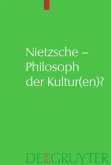The topic of â??grandeurâ? is found throughout Nietzscheâ??s corpus. Nietzsche problematizes the term with adjectives like â??grand reason,â? â??grand health,â? â??grand politics,â? or â??grand afternoon.â? Moreover, the idea is also contained in metaphors like â??the eternal return of the same,â? the â??overman,â? the â??will to power,â? the â??arrow of longing,â? or â??lightening striking.â? For Nietzsche, there is no grandeur without a sense of the small, and criticism of the most subtle details indicates a comming grandeur.
The contributions to this collection are dedicated to the themes of Nietzsche/Power/Grandeur from philosophical, political, historical, aesthetic, and cultural studies perspectives.
Die Thematik des Großen durchzieht Nietzsches gesamtes Werk. Sowohl adjektivisch als "Große Vernunft", "Große Gesundheit", "Große Politik" oder "Großer Mittag" wird sie problematisiert, wie sie auch enthalten ist in Metaphern wie der "ewigen Wiederkehr des Gleichen", des "Übermenschen", des "Willen zur Macht", der "Pfeile der Sehnsucht" oder des ereignishaft einschlagenden "Blitzes". Für Nietzsche gibt es keine Größe ohne den Sinn für das Kleine, die Kritik am Kleinen deutet auf kommende Größe.
Die Beiträge dieses Bandes widmen sich dem Komplex Nietzsche/Macht/Größe aus philosophischen, politischen, historischen, ästhetischen und kulturwissenschaftlichen Perspektiven.
The contributions to this collection are dedicated to the themes of Nietzsche/Power/Grandeur from philosophical, political, historical, aesthetic, and cultural studies perspectives.
Die Thematik des Großen durchzieht Nietzsches gesamtes Werk. Sowohl adjektivisch als "Große Vernunft", "Große Gesundheit", "Große Politik" oder "Großer Mittag" wird sie problematisiert, wie sie auch enthalten ist in Metaphern wie der "ewigen Wiederkehr des Gleichen", des "Übermenschen", des "Willen zur Macht", der "Pfeile der Sehnsucht" oder des ereignishaft einschlagenden "Blitzes". Für Nietzsche gibt es keine Größe ohne den Sinn für das Kleine, die Kritik am Kleinen deutet auf kommende Größe.
Die Beiträge dieses Bandes widmen sich dem Komplex Nietzsche/Macht/Größe aus philosophischen, politischen, historischen, ästhetischen und kulturwissenschaftlichen Perspektiven.









